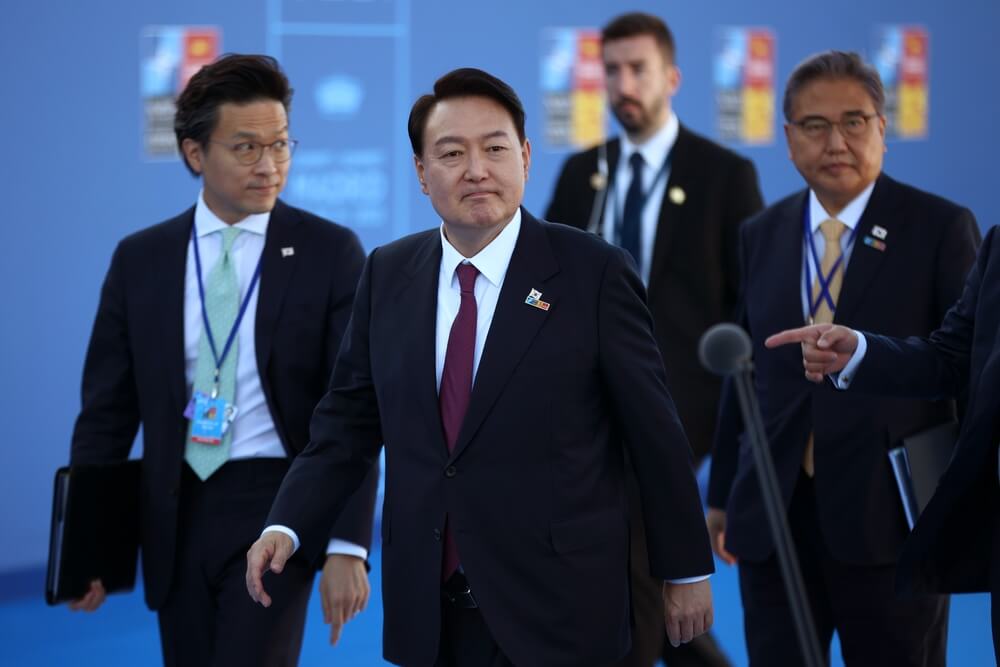The European Union and South Korea rapidly reacted to major changes in international circumstances that directly affected them and concluded the Security and Defence Partnership Agreement.
On the one hand, this is a logical sequence and the crowning achievement of several years of significant progress in security cooperation between a number of Union member states and South Korea, formalised by a series of bilateral agreements. Among them are France, Germany, Poland, and the UK.
But, on the other hand, the conclusion of the agreement shows that the EU and South Korea can react rapidly and pragmatically to prevent the negative consequences of specific political and military actions in their environment.
Both the EU and South Korea have traditionally tied their security to reliance on the US. Does this agreement between Seoul and the 27 European countries go beyond that framework?
Certainly not, but it speaks volumes about the maturity of the partners to align their increasing security ambitions without external interference in a way that stimulates their immense technological and industrial capabilities, for example, in the military domain.
Preparing for the worst-case scenario
Just one day prior to Donald Trump's victory in the US presidential election, the agreement took place in Seoul. Despite not knowing the outcome of those elections in advance, the signatories appear to have largely prepared their security and defence agreement for the period when Donald Trump will hold the US's security umbrella over all its allies.
One of the elements of the agreement between the EU and South Korea is cybersecurity and the exchange of knowledge on conducting cyberwarfare. Another element of the agreement, for example, is the framework for cooperation in preventing the proliferation of nuclear weapons, including joint naval patrols around the Korean Peninsula and the exchange of intelligence relevant to counterproliferation activities.
The agreement also includes a section on the joint development of new technologies and combat systems, whereby the two technological giants strive to shorten and reduce the cost of their research and development operations in the military industry sector.
The Europe-South Korea deal may appear to be primarily economic
These and many other aspects of the Europe-South Korea deal may appear to be primarily economic, with less emphasis on military and security. However, they are not incompatible with the shared security support from the US.
However, given the new circumstances following Trump's victory, the agreement between the EU and South Korea strongly indicates both parties' desire to navigate the anticipated challenges in the field of security cooperation between the US and its allies as independently as possible.
The same existential threats
Neither the EU nor South Korea want to spend the next four years in uncertainty as to whether the US will remain their key protector or whether the new president will again say that the allies should pay their shares or that America is withdrawing.
Europe is wary of the Russian military threat, which can only gain wings if it achieves goals in Ukraine that Trump hints he would not mind. South Korea is wary of the danger in its neighbourhood from North Korea, which, by sending first weapons and now troops to Russia, opened an extremely risky chapter in the tense history of the Peninsula.
The outgoing head of European diplomacy, Josep Borrell, highlighted this parallel between "existential threats" as the motive for concluding the agreement at the beginning of the month in Seoul when he signed the security agreement with South Korea.
The security agreement is a strategic response to the sending of thousands of North Korean soldiers to fight on the side of Russia
"The Republic of Korea is in the best position to understand this," Borrell said, drawing a parallel between the growing military risks posed by Russia and North Korea.
The rapid reaction and conclusion of the security agreement with the EU, which is a strategic response to the sending of thousands of North Korean soldiers to fight on the side of Russia, fully demonstrated the pragmatism of the Seoul government.
Indirect reflections on China
So far, South Korean officials have warned many times that the participation of North Korean troops in Russian invasion operations fundamentally undermines the security framework on the Korean Peninsula.
Firstly, the alliance with Moscow, another isolated and renegade regime, could lead to Pyongyang receiving much-needed technology, including nuclear weapons, in exchange for "fraternal" assistance in providing manpower to the Russian army.
 Depending on the level of North Korean involvement, we will gradually adjust our support strategy in phases. This means we are not ruling out the possibility of providing weapons - Yoon Suk Yeol
Depending on the level of North Korean involvement, we will gradually adjust our support strategy in phases. This means we are not ruling out the possibility of providing weapons - Yoon Suk Yeol
Moreover, this could be the reason why Seoul might start supplying arms to Kyiv, which it has been reluctant to do for almost three years.
“Depending on the level of North Korean involvement, we will gradually adjust our support strategy in phases. This means we are not ruling out the possibility of providing weapons,” said South Korean President Yoon Suk Yeol recently.
In addition to direct risk factors like Russia and North Korea, the European-South Korean security partnership also indirectly influences China, a nation with which the EU and South Korea share close positions.
The new security partnership is, in this respect, a demonstration of the intention to meet the potential escalation between the US and China as readily as possible, with as few negative consequences as possible for America's European and East Asian partners.